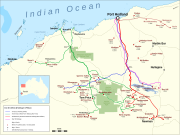Eastern Range Mine
The mine is partly owned and operated by Rio Tinto Iron Ore and is one of twelve iron ore mines the company operates in the Pilbara. In 2009, the combined Pilbara operations produced 202 million tonnes of iron ore, a 15 percent increase from 2008. The Pilbara operations accounted for almost 13 percent of the world's 2009 iron ore production of 1.59 billion tonnes.
The Hamersley Range, where the mine is located, contains 80 percent of all identified iron ore reserves in Australia and is one of the world's major iron ore provinces.
Overview

Rio Tinto iron ore operations in the Pilbara began in 1966. The mine itself began operations in 2004. The combined production capacity of the Paraburdoo, Eastern Range and Channar mines is 20 million tonnes of iron ore. The ore is processed both at Eastern Range and at Paraburdoo before being loaded onto rail, being transported from Eastern Range to Paraburdoo by conveyor belt.
Ore from the mine is then transported to the coast through the Hamersley & Robe River railway, where it is loaded onto ships. Ore from Eastern Range, like Brockman, Mount Tom Price, Paraburdoo, Channar, Marandoo and Yandicoogina are transported as lump and fines ore product from the mines to Dampier via rail. Before being loaded onto ships for export, the product is blended and rescreened. The maximum size for the lumps is 31.5 mm, while the fines are at a maximum of 6.3 mm.
The mine's workforce lives residential in Paraburdoo. In 2009, the combined operations of Paraburdoo, Channar and Eastern Range employed 1,081 people, a decrease in comparison to 2008, when it employed 1,324.
The mine is jointly owned by Rio Tinto, who holds 54% and Chinese company Shanghai Baosteel Group Corporation, who owns the remaining 46%. Shanghai Baosteel acquired its share in the mine in April 2004 in order to secure a long-term, stable supply of resources for the Chinese economy. Rio Tinto's share of the mine is owned through Hamersley Iron Pty Ltd, a fully owned subsidiary, which owns six mines in the Pilbara, and partly owns two more mines in the region, including Eastern Range.
While the Eastern Range deposit was known for two decades, it took China's emergence as a major steel producer and oversees investor to develop the mine.
References
- ^ MINEDEX website: Eastern Range search result Archived September 11, 2008, at the Wayback Machine accessed: 6 November 2010
- ^ Pilbara Archived October 21, 2013, at the Wayback Machine Rio Tinto Iron Ore website, accessed: 6 November 2010
- ^ Mining Archived June 12, 2010, at the Wayback Machine Rio Tinto Iron Ore website, accessed: 6 November 2010
- ^ Preparing for the future Archived July 15, 2011, at the Wayback Machine Rio Tinto presentation, published: 23 March 2010, accessed: 7 November 2010
- ^ Global iron-ore production falls 6,2% in 2009 - Unctad report miningweekly.com, published: 30 July 2010, accessed: 7 November 2010
- ^ Production of iron ore fell in 2009, but shipments continued to increase, report says UNCTAD website, published: 30 July 2010, accessed: 7 November 2010
- ^ Iron fact sheet - Australian Resources and Deposits Archived February 18, 2011, at the Wayback Machine Geoscience Australia website, accessed: 7 November 2010
- ^ Eastern Range mine Archived 2010-06-14 at the Wayback Machine Rio Tinto Iron Ore website, accessed: 6 November 2010
- ^ Rail Archived July 1, 2013, at the Wayback Machine Rio Tinto Iron Ore website, accessed: 6 November 2010
- ^ Iron fact sheet - Mining Archived February 18, 2011, at the Wayback Machine Geoscience Australia website, accessed: 7 November 2010
- ^ Western Australian Mineral and Petroleum Statistic Digest 2009 Department of Mines and Petroleum website, accessed: 8 November 2010
- ^ China in box seat on a BHP, Rio deal The Australian, published: 9 November 2007, accessed: 7 November 2010
- ^ Steel mills dig in overseas China Daily, published: 27 April 2004, accessed: 7 November 2010
- ^ Booming China Devouring Raw Materials The Washington Post, published: 21 May 2004, accessed: 7 November 2010